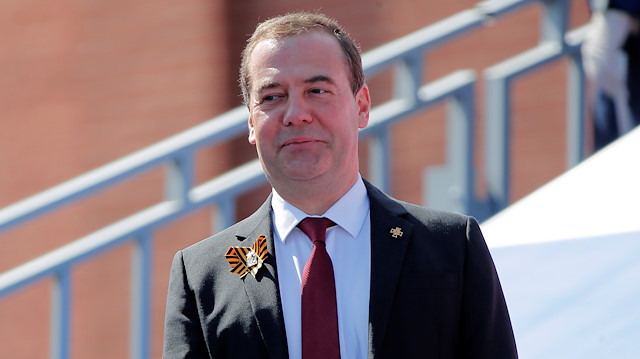

Deputy Head of Russia's Security Council Dmitry Medvedev
Former Russian prime minister says Russia-Turkey cooperation in Nagorno-Karabakh 'stabilizing factor'
Russia cannot ignore Turkey's position on the Nagorno-Karabakh conflict, Deputy Chairman of the Russian Security Council and former Prime Minister Dmitry Medvedev said on Monday.
Speaking in an interview with the Russian media about Turkey's role in the Karabakh issue, Medvedev stressed close Turkish-Azerbaijani relations and significance of Russia-Turkey partnership.
He also called the Russian-Turkish cooperation in Nagorno-Karabakh "a stabilizing factor".
"Turkey is our neighbor and a very important partner. And a very close country for Azerbaijan. This factor cannot be ignored. We have a productive dialogue with them — the president of our country constantly communicates with President [of Turkey Recep Tayyip] Erdogan on this topic.
"We must take into account the realities that exist in our region. And the reality is that today this issue needs to be discussed with our partners from Turkey," he said.
Medvedev reaffirmed Russia's commitment to a diplomatic solution to the Karabakh conflict, but said the issue of Karabakh's territorial status should better be postponed to a future period, because it can provoke new escalation.
- What happened in Karabakh?
Relations between the former Soviet republics had been tense since 1991, when the Armenian military occupied Nagorno-Karabakh, internationally recognized as an Azerbaijani territory, and seven adjacent regions.
When new clashes erupted on Sept. 27, 2020, the Armenian army launched attacks on civilians and Azerbaijani forces and even violated humanitarian cease-fire agreements.
During the six-week-long conflict, Azerbaijan liberated several cities and nearly 300 settlements and villages, while at least 2,802 of its soldiers were martyred. There are differing claims about the number of casualties on the Armenian side, which, sources and officials say, could be up to 5,000.
The two countries signed a Russian-brokered agreement on Nov. 10, 2020 to end the fighting and work towards a comprehensive resolution.
A joint Turkish-Russian center became operational on Saturday to monitor the truce, with 60 Russian and 60 Turkish troops on duty.
On Jan. 11, the leaders of Russia, Azerbaijan, and Armenia signed a pact to develop economic ties and infrastructure to benefit the entire region. It included the establishment of a trilateral working group on Karabakh.
The cease-fire is seen as a victory for Azerbaijan and a defeat for Armenia, whose armed forces have withdrawn in line with the agreement.
Violations, however, have been reported in the past few weeks, with some Armenian soldiers said to have been hiding in the mountainous enclave.
#Dmitry Medvedev
#Nagorno-Karabakh conflict
#Russia

